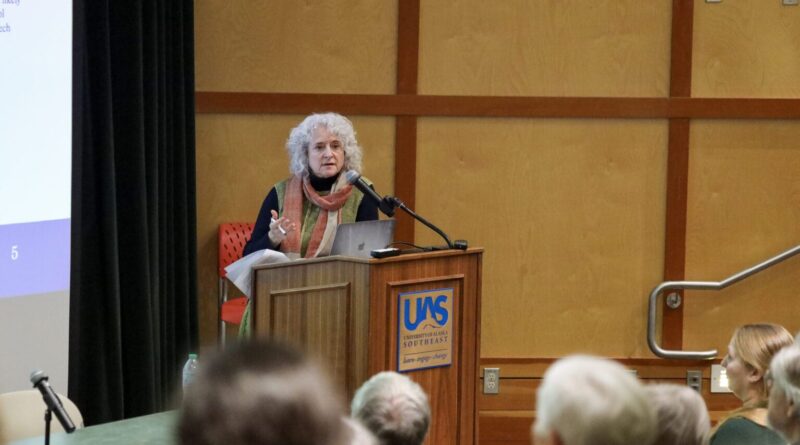Immigration advocates equip Juneau residents concerned about deportation with facts about their rights
A panel of civil rights and immigration advocates addressed how immigration policy changes from the Trump administration may affect Alaskans to a crowd of about 50 community members at the University of Alaska Southeast on Wednesday.
The policy changes mean that Alaska residents who were previously legally allowed to be here may be at risk for deportation. There are about 55,000 immigrants in the state currently.
The panel focused on what individuals, schools, churches and businesses can do legally to prepare their communities for encounters with immigration enforcement.
Mara Kimmel from the American Civil Liberties Union of Alaska said there isn’t evidence of immigration enforcement efforts in Juneau at this time, but people across the state are scared.
“So many of our friends and fellow Alaskans, family members, communities, are living in serious fear, and a lot of that fear is because we don’t know what’s coming,” Kimmel said. “So the best thing that we can do is to make sure that each and every one of us is prepared.”
Kimmel says the Trump administration recently changed a policy that barred U.S. Immigration and Customs Enforcement officers from enforcing immigration laws in schools, churches and hospitals. Now, those spaces are not protected.
“They can no longer assume that they are off the map for immigration enforcement,” she said.
Kimmel recommends clearly labeling private spaces within these organizations. ICE officers would have to present a signed judicial warrant to access private spaces.
Issa Spatrisano is the Alaska State Refugee Coordinator. She said the Trump administration has ended the Refugee Admissions Program. That closes off one of the main ways refugees can legally enter the country and it had immediate effects on people who were about to leave their country of origin.
“This has serious implications in our state,” she said. “There were 22 individuals who had flights booked, who had flights booked to the state of Alaska, whose flights were then removed as a result of that.”
Those are people who have been waiting an average of 17 years to get refugee status to come to the U.S. Many, she said, have family in Alaska who have been waiting for them.
The majority of the more than 30 immigrants in Juneau who have fled unsafe conditions in their home countries are here under two types of temporary status, Spatrisano said. Humanitarian parole is a program the administration ended in January. Temporary protected status is a program based on the person’s country of origin. Trump has ended TPS for people from Venezuela.
At this time, people under humanitarian parole or an ended TPS status still have the rest of their allotted time before they would have to leave the country. However, Spatrisano said the Department of Homeland Security has implied that the administration may move to revoke status, leaving people with no warning before their status becomes invalid.
Kimmel pointed to resources on the ACLU Alaska website for immigrants and those who work with them to use for immigration enforcement encounters.

